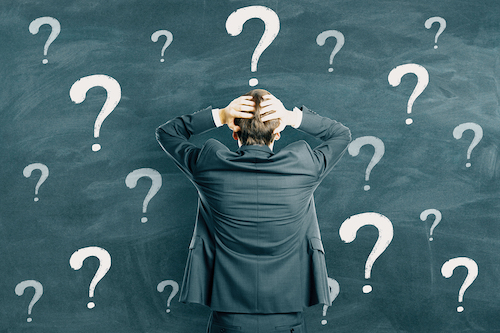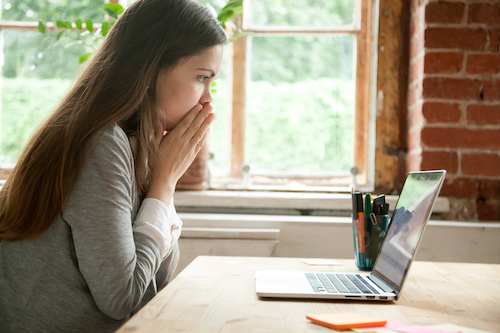February 19, 2021
by Tina Arnoldi
-thumb.jpg)
The "It Gets Better" project aims to reduce suicide among LGBT adolescents by offering narratives by mainly adult LGBT persons. A recent, but very small study, found both positive and negative aspects of these campaigns. Messages were helpful for promoting hope, but there was a perceived lack of diversity on sexual identities, and some shallowness around suicidal ideation. I invited experts to comment on whether these types of campaigns can make a difference.
[More]
November 18, 2019
by Elizabeth Pratt

Results from the 2019 Stress in America Survey have found shootings, climate change, politics and health care are some of the issues causing American adults significant stress.
[More]
September 27, 2019
by Elizabeth Pratt

Even for those disinterested in politics, social media and a 24-hour news cycle ensure it’s hard to miss the latest political debacle unfolding in the nation’s capital.
Now researchers have determined exposure to politics is having a negative impact on the mental and physical health of Americans.
[More]
November 8, 2018
by Elizabeth Pratt

People aged 15 to 21 are experiencing significantly higher levels of stress due to what they see in the news when compared with adults. Despite this, Gen Z is less likely to vote.
[More]
The recent political debates have shown a less than desirable side of the candidates. Name calling, berating comments and even attacking the other candidate’s wife has become a part of the political arena. It appears
[More]
Sasha enters the waiting room of her psychologist trembling. Her heart is racing as she struggles to breathe. She has heart palpitations and the room is spinning. She feels as if she is about to die. The psychologist rushes out to console and comfort her. Sasha is having a panic attack. Why? Prior to her therapy appointment, she watched countless hours of a local news network covering the recent events centering police brutality. Sasha has a similar story. She was assaulted by police several years prior. As a result, she developed Post-Traumatic Stress Disorder.
[More]
October 31, 2014
by Marti Wormuth, MA

One thing that seems to be coming up in the news a lot is mental health. Whether it's a new mental health discovery, or it's something that has occurred that causes us to talk about the mental health care system in our country, there are a lot of questions out there about the mental health system and what can and/or should be done about it. But why does this keep happening?
[More]
September 1, 2013
by Cindy Marie Hosszu

Social Creatures
We humans are social animals. Our minds and bodies are wired to socialize for good reason. As a species, we use our socialization to solve problems, find safety, and survive. Every now and then, of course, we need a break from the social pack, and to retreat to a more quiet state of solitude, but what happens when that solitude becomes isolation?
Sometimes we feel alone, even in a crowded room. Sometimes we have no choice in the feelings, and other times, we enjoy being alone, and choose to separate ourselves from others. It may start with a change in our lives, like moving to a new area, or off to college. It could be that people have disappointed us, and we feel the need to protect ourselves from the feelings of pain associated with the loss of someone from whom we expected more, or that made us feel unwanted or unloved. Maybe we just feel socially inadequate, or ill at ease with others.
Regardless of how it starts or what perpetuates isolation, it is important that we understand the relevance of being socially connected to others. We connect to others on different levels. For some, this connection can be a strong bond, and for others it may be small talk with strangers, but in all cases, we are increasing our ability to survive, as well as securing our human instinct. It is important that we human animals consider the reasons that socialization is built into our system. We need each other to survive, and problem solve.
Dying To Be Social
In 2006, researchers reviewed data gathered from over two decades and found that Americans were less and less connected socially.[1] The average network had decreased by about a third from 1985 to 2004. With the changes in technology from smart phones, and tablets, the average person is far less likely to engage in person to person contact as they were even in 2004. You can see this when you observe most restaurants and see families of people all engaged in their personal devices. Even in a family unit, we seem to be losing our socialization, and that is alarming considering how damaging isolation can be to individuals.
A 2013 study found that social isolation is associated with a shortened life.[2] The study, led by Andrew Steptoe, followed 6500 men and women 52 and older, and measured the consequences of loneliness and isolation on health. While both can affect well-being, the researchers found that isolation, independent of loneliness, has 1.26-fold increase in death. One of the interesting things that this study highlights is that while we may feel lonely, any kind of social interaction, even as small as chit-chat with a stranger can help our health. It is not necessarily those strong bonds of close relationships. It also points out that even those who are content in their solitude need the contact of others to be healthy. Some of the reasons that may contribute to isolation’s effects on older adults are that there is no one to notice when they are declining, and they do not get the help they need, whether it be physically, or emotionally.
Social Media Doesn’t Count
Those who prefer to avoid the physical social contact may be tempted to use social networking as surrogate social contact, but that is not a good choice for those who like to be alone. Social networks may add to the problem of social isolation by creating negative feelings toward others. German research has found that social sites, specifically Facebook in this study, make people feel lonelier due to envy.[3] The reader of a social update may feel that others have more enjoyment in life, and have better social opportunities than themselves. Of the things that frustrated users in the study, 29.6 % felt envy, or social upward comparison. Another 10.4% felt loneliness, and 19.5% felt a lack of attention due to lack of comments, likes, and feedback. The areas in which envy was produced were travel and leisure, social interactions with others, love, family, and relationship success. Interestingly, this research was specific to passive users. For more about social media, read Therapy: A Connection with the Interconnected.
How Does Therapy Help?
Therapy can help determine the emotional and psychological reasons for the need to isolate, as well as give support and help to build a social support network. When we find it hard to make friends, or that social interactions are just too much for us, a therapist can offer tools that allow us to cope with the situation. If you find yourself feeling lonely, angry, or critical of others, or have no feelings of being part of a group there is someone who can not only listen, but equip you with the tools to help you out of feeling isolated.
[1] McPherson, M., Smith-Lovin, L., & Brashears, M. E. (2006). Social isolation in america: Changes in core discussion networks over two decades. American Sociological Review, 71(3), 353-375. Retrieved from http://search.proquest.com/docview/218830661?accountid=3358
[2] Steptoe, A., Shankar, A., Demakakos, P., & Wardle, J. (2013). Social isolation, loneliness, and all-cause mortality in older men and women. Proceedings of the National Academy of Sciences of the United States of America, 110(15), 5797. Retrieved from http://search.proquest.com/docview/1326426096?accountid=3358
[3] Krasnova, H., & Et al (2013). Envy on Facebook: A Hidden Threat to Users’ Life Satisfaction? Institute of Information System. Retrieved from http://warhol.wiwi.hu-berlin.de/~hkrasnova/Ongoing_Research_files/WI%202013%20Final%20Submission%20Krasnova.pdf
July 1, 2013
by Ashley Marie

There is a lot of hype about social media, and I understand its advantages. I have a network of friends across the globe that I can tap into within seconds. I can Skype my sister in California, Facebook my friend in New York, Tweet to my former classmate in London, and comment on my boyfriend’s Instagram photo taken in Winnipeg – all with very little effort.
The Dawn of Social Media
This digital connectivity is a historically recent phenomenon.
Its beginnings trace back to 1991, when Tim Berners-Lee connected hypertext technology with the Internet, leading to the creation of the World Wide Web.[1] Soon, email replaced snail mail and weblogs replaced printed diaries and journals. New communities formed online, creating alternate means of social interaction.
A decade later, Web 2.0, a term coined by Darcy DiNucci,[2] shifted the dynamics of virtual communities. Instead of only allowing Internet users to passively read online content, Web 2.0 now permitted individuals to actively interact as creators of user-generated content. Today, social media outlets – such as Facebook, Twitter, Google+, LinkedIn, and Skype – form a large part of social interactions.
How Social is Social Media?
We have witnessed a series of technological breakthroughs, but has there been a corresponding social breakthrough? Has social media contributed to us becoming more social?
Proponents of social media suggest that it has enhanced our relationships. Rainie et al., for instance, claim that individuals should not fear the Internet; rather, if they learn how to network effectively online, they can benefit from endless possibilities to offer support, exchange information, and converse with people all across the globe.[3]
But while online communities can produce a greater quantity of personal contacts, they tend to diminish the quality of interactions.
Malcolm Gladwell is critical of the laziness that social media encourages. He argues that it is so easy for people to participate in social networks that they end up devoting less time and energy to their interactions with others.[4]
Social media eases connectivity, but connectivity is not the same as connection. I can instant message my father in Guadalajara, but our online conversation will only scratch the surface of a deep father-daughter connection.
The bases of profound relationships – such as trust, commitment, and compatibility – are difficult to strengthen via pixels on sleek displays, no matter how aesthetically appealing and user-friendly they might look.
As pointed out by Monserrat, a person's tone of voice and body language is essential to forming strong relationships.[5] It is easy to ‘like’ a friend’s Facebook photo, but it takes more time and involvement to show someone that you sincerely care about their well-being.
Some interactions on social media can even produce anti-social behaviours.
A survey conducted by VitalSmart revealed that 1 in 5 individuals has blocked, unsubscribed, or unfriended someone else due to an online quarrel.[6] In other words, bullying, rudeness, and disrespect have permeated a medium intended to foster favorable social interactions.
Therapists: Listening Ears to Deaf Crowds
Means of communication are changing quickly, and therapists should reflect on how to respond to this new age of hyper-interconnectivity. They should not fear social media, but they should understand its strengths and weaknesses.
Participating in online networks can help build a therapist’s practice, allow for up-to-date exchanges of information, as well as produce healthy dialogues about mental health issues.
However, therapists should also recognize that – perhaps more than ever – they have unique contribution to make to the quality of people’s lives.
Fast-paced lifestyles combined with superficial virtual communities can produce social alienation, causing many to disconnect from others and even from themselves.
For some, a therapist might be the only person who can offer a full hour of their time to listen to their story, provide helpful insights, and encourage them along their journey – all without the interruption of Tweets, Facebook messages, Instagram photos, and LinkedIn updates.
Therapists offer a breath of fresh air in a world polluted by restless online hyperactivity.
[1] Van Dijck, J. 2013. The Culture of Connectivity: A Critical History of Social Media. New York: Oxford UP, pp 5.
[2] DiNucci, D. 1999. Fragmented Future, Print Magazine. pp 32, 221-2.
[3] Rainie, H., L. Rainie, and B. Vellman. 2012. Networked: The New Social Operating System. Cambridge, MA: MIT Press, pp. 255.
[4] Gladwell, M. Small Change, The New Yorker, [online] Available at:
<http://www.newyorker.com/reporting/2010/10/04/101004 fa_fact_gladwell> [Accessed 30 June 2013].
[5] Monserrat, A. Leadership Means Face-to-Face, Not Facebook, Forbes, [online] Available at: < http://www.forbes.com/sites/forbesleadershipforum/2011/ 08/29/the-social-media-fallacy-real-leadership-means-face-to-face-not-facebook/> [Accessed 30 June 2013].
[6] People more likely to be rude on social media; affects friendships in real life. Daily News, 10 April 2013. [online] Available at: <http://www.nydailynews.com/life-style/friendships-cut-short-social-media-article-1.1312747#ixzz2XjSTFeew> [Accessed on 30 June 2013].
September 13, 2011
by Arthur Hunter

By Tanya Glover
Theravive.com Contributor
In today’s world our children have things that we never dreamed of having as children! The internet is wonderful in and of itself but social networking has been a main focus of the web since MySpace was created. It was all downhill from there as other companies decided to jump on the social networking bandwagon. Now the two largest social networking sites are Facebook and MySpace and boy do kids and teenagers love those sites! As a parent, I am fine with my children using their Facebook accounts. But, there are responsibilities that come with using such technologies and this is what your children must learn to be safe on social networking sites.
What Goes on the Internet Stays on the Internet
When we are teenagers we did very little deep thinking as to what the consequences of our present behaviors can mean to our future. The wrong thing posted online can haunt you forever. Every comment, every picture, every behavior-good and bad, stays etched in stone on the World Wide Web. This is something that must be driven home to your children. Of course though they will think you are overreacting and have no clue what you are talking about. After all, we are just parents so what do we know? We were never teenager’s right? I remember thinking that about my parents as a teenager and now I can look back and understand that they did know what they were talking about and most of it was right on the money, although I did not see it at the time. Here are the things that your teen needs to understand about the consequences of their actions dealing with social networking.
ØDo not post any pictures that you would not want your parents, teachers, grandparents, or church clergy to see. If they would find it questionable then so would others.
ØWatch the language you use on your Facebook or other social networking site. Again, if you would not be proud to show others this language then you do not want it on your page.
ØDo not talk about behaviors that you know are harmful, illegal, or dangerous.
ØDo not gossip, pick on, or otherwise slander others on your page or anyone else’s.
ØDo not pick fights, threaten, or allow yourself to be baited into an altercation online.
You Never Know Who is Checking on You
These are not just a random list of no-no’s. Each one has a reason behind it and most of it has to do with your child’s future and what it will become. In today’s technological society, there are many people who will examine ones Facebook or MySpace page. This is done for many reasons.
Colleges
If you’re teen plans on being college bound, once his or her application is received they are going to be examined and investigated. One of the first things that colleges do today is look up the applicants social networking pages. If when they go to their page and see a picture of your child in sexual poses or engaging in drinking or drugs then that application will go in the denied pile. Even if your teen has had these pictures removed, they are still there somewhere! Again, just because you delete it does not mean it is gone. The internet saves everything you do.
Potential Employers
As with colleges, many employers want to see your social networking sites too. They feel that they can get to know one’s character better by doing this. If they see questionable pictures, comments, or behaviors on the page then the probability of getting that job is almost zero. Employers tend to dig deep in order to find the best and most reputable employees for their company. Someone who curses and insults others or posts pictures of themselves drinking and partying will not make the cut.
Big Brother is Watching
Well-maybe not Big Brother but close enough. Officers and other government officials do keep watch on social networking sites. If someone is using these sites to threaten, abuse, bully, or otherwise mistreat someone else then they can be looking at a very serious situation. Communicating threats is a crime in every state and by doing so in a public forum you are opening up yourself for some big time trouble. Again, you can delete your comments but they ARE STILL THERE.
Deadly Consequences
Over the past few years there have been several cases where, due to activity on social networking sites, teenagers have committed suicide. What is the cause of this drastic action? Typically it is because someone has bullied them on a social networking site where other outsiders have joined in until the teen was so overwhelmed by the attacks that they take their own lives. To find out who played a role in the death of the teen, law enforcement uses proof found on the social networking sites. Each person who verbally attacked or threatened the victim can be held responsible for the suicide. While I am sure that those involved never meant for the victim to take their own life, they did play a part and legally speaking, often must pay the price for that.
Losing Credibility
Another case of harm done due to social networking deals with a college professor, a student, and an internship director. The college student applied for an internship with a prestigious company and the sole reason she was awarded the position was because of the glowing letter of recommendation her college professor wrote for her. Once she began the internship the employer came across her Facebook and was furious with the professor who recommended her so highly. On her page were pictures of her in engaged in sexual behavior, heavy drinking, and drug use. The professor’s only excuse was that the girl he knew was a nice and studious person and he had never thought to look at her Facebook page. The girl lost her internship position and the professor lost his credibility with the employing company.
Conclusion
It is clear why you should stress responsible and respectful behavior to your children and teens when it comes to what they post on the internet. Something you did when you were 16 can, and often times does, have a profound effect on the things you do in the future. For a young person it may seem like a small issue but if they do not grasp this information now, by the time they do realize you were correct it may just be too late. As a parent you have a right to know what your child is doing online. Make it a rule that you will have to know all their passwords so you can check on what they are doing whenever you feel the need to do so. If you find something that is contrary to the responsibilities you have explained to them then you may have to go over the list again or maybe even take their computer privileges for a set amount of time. For repeat offenses it may be necessary to have their social networking sites deleted until you feel they are able to use them responsibly. You must do whatever it takes and they may be angry with you at the moment, but in the future they will thank you for being such vigilant parents and for protecting them from themselves.